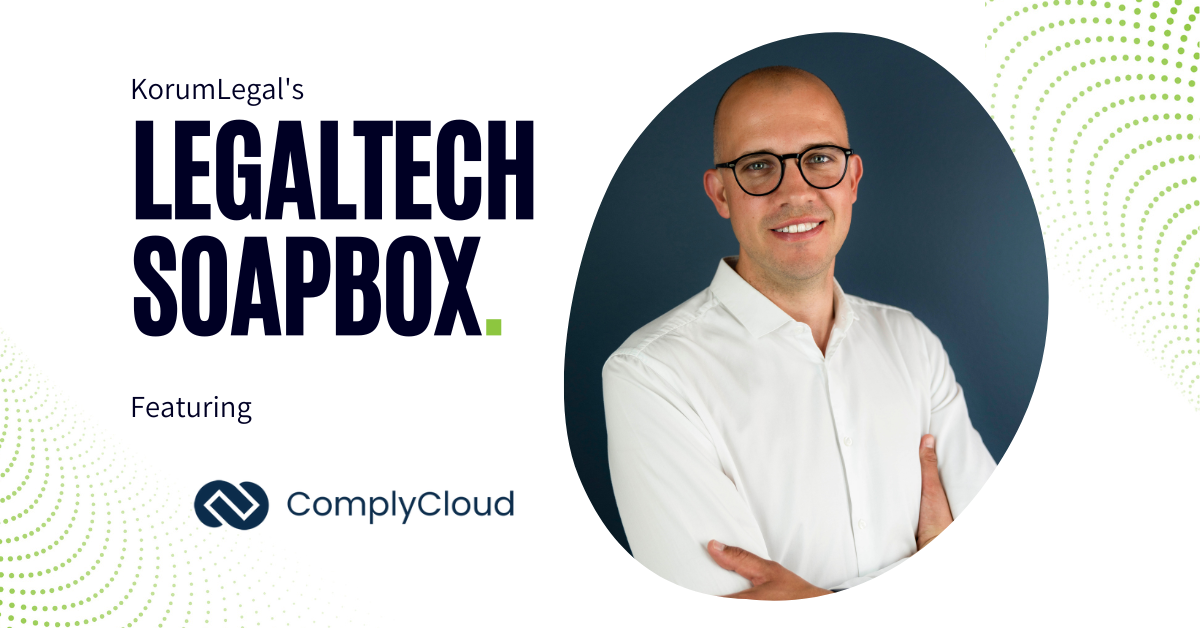LegalTech Soapbox: Empower your daily operations with ComplyCloud.

1. Hi Martin tell us the story behind ComplyCloud.
The story starts in 2017, when GDPR and its implications started shaping the agenda of many organisations. It gave me the final push to fulfill my founder dream of fixing compliance. From my attorney point of view, the compliance landscape lacks transparency. I thought and still think that compliance must be fixed with a mix of deep legal knowledge along with technology. In the end, making organisations comply with our various laws is necessary to uphold our society and democracy.
My view on fixing compliance is not in the sense of a quick fix. It is rooted in my belief in efficient compliance with our laws as a corner stone in a democratic society.
My journey as a founder did not start easy. I was lucky to find a co-founder who wanted to take the big step with me – and he could develop the actual technical product. Nevertheless, after all our founder-talks, my co-founder bailed on me on the start line just after I had irrevocably resigned my own safe and good position as a lawyer at a Tier-1 law firm.
So, day 1 and my co-founder had backed out. Since I had just bought a house and had two kids and a wife to support (now I have three kids and same wife), I needed to figure out how to make money and make a difference, while not having a real tech product. I only had a PowerPoint presentation with 176 slides to show the design of our software. I went on a ‘Tour de Charm Offensive’ for 3-4 months, including to Web Summit in Portugal, to figure out who had the need for this. The work indeed paid off because all the feedback and input I got from people I met along the way made me able to gather evidence for the perfect market fit – that you build something that works and cures a headache. I didn’t know it, but I was actually doing discovery with a minimum viable product.
And it’s the reason why we today have a solution that is one of the only ones that combines technology with in-house legal expertise – and that, in my best attempt to do some humble bragging, I’m next level proud of.
2. What are the services or products that ComplyCloud provides?
We offer compliance solutions and legal guidance ‘on-demand’ within data protection, information security, and artificial intelligence.
With a landscape that gets more and more regulated due to namely the GDPR, NIS2 Directive, and AI Act, it also gets harder for many companies to comply with these regulations. Either they don’t have the legal knowledge, or they don’t have the time.
It’s a classic that we see an HR employee, or a secretary being appointed as the person responsible for GDPR in an organisation, but this person rarely has the skills to do the job. That is of course not the case regarding the legal and compliance specialists we help; instead, we ensure they save time and money by freeing them from the manual efforts is the main value we bring them.
So, to put it in a nutshell, we lift a burden for our customers within both legal compliance and operational compliance.
3. How does the above optimise the daily operations of an in-house legal team/ law firm?
Our software makes it possible for in-house legal teams to swap their Excel sheets and other manual processes with pre-made and AI-generated content, automated processes, and reminders on important tasks and deadlines.
Thanks to my team of in-house lawyers, we develop and update our platform on the newest regulations, decisions from the DPAs, and so forth.
Essentially, that means that in-house legal counsel can use their time where they make an actual impact and create value that goes beyond “just legal”. That impact and value is best done with their team and with the business instead of behind a screen producing documents, overview, or spreadsheets and workflows that our software will instead take care of.
4. What do you believe will be the most significant change in how in-house legal teams use technology in the next 10 years?
In the next 10 years, I believe we’ll see even more of the trend and need we see now: that legal teams – and organisations in general – want to outsource the manual work and streamline processes to win more time for their core business and what brings them most value. In the end, all legal professionals want to be trusted advisors that are trusted based on their personal advice and integrity, not only based on legal analyses that can be done by a machine.
Lily Evans and Martin Folke Vasehus
Sep 11, 2024
Related Posts.
By: KorumLegal
GC Spotlight: Vincent Ng, Klook
On our GC Spotlight this month is Vincent Ng, General Counsel and Head of Public Affairs at Klook, a global travel platform. Vincent started as the Sole Counsel for Klook and is now the GC. He sheds..
